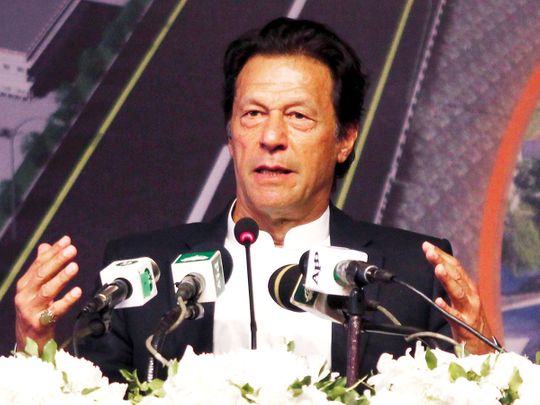
As Pakistan’s recently-elected Prime Minister Imran Khan grapples with multiple challenges, the issue of ties between the country’s civilian government and the army continues to be an oft-repeated theme.
More than a decade after General Pervez Musharraf stepped down as Pakistan’s last military ruler, parts of the country’s political elite consider the military as the dominant force in national affairs. Elsewhere, too, such as the media and the societal mainstream, references to the ‘establishment’ often point towards the military as the main driver of key policy affairs.
This trend is partially driven by Pakistan’s 72-year history. A little less than half of that period has been spent under military rule. But to argue that all of Pakistan’s present-day shortcomings are rooted in that past would clearly be a distortion of reality.
Some of Pakistan’s most regressive trends have emerged in the past four decades — a period divided evenly between civilian and military rule. The record of successive civilian regimes in even partially leading Pakistan towards progressive change has been at least half pathetic, notwithstanding many regressive trends dating back to the rule of the late General Zia ul Haq in the 1980s.
And the period with the worst internal security crisis during the aftermath of the 2001 terrorist attacks in New York has clearly placed the Pakistan army in the driving seat of national security.
While Pakistan has suffered across the board during this time, the military has been no exception in taking huge losses. A TV documentary by a private network this month vividly highlighted evidence of life having returned to normal across North Waziristan — a region along the Afghan border where Taliban militants once virtually ruled before an aggressive army-led campaign forced them out.
Just hundreds of miles away from Waziristan, in Rawalpindi, where the Pakistan army maintains its headquarters, a visit to the local rehabilitation centre at the main army hospital shows multiple examples of young officers and soldiers who were badly injured in fighting terrorists. Many lost their limbs and now must reconcile with the painful reality of living their lives under constant medical care.
While these examples are part of history the ultimate challenge lies in exactly how Pakistan carves the road to its future. The scale of Pakistan’s challenges make it essential for all institutions of the state including the armed forces and civilian governments to remain on one platform. Recurrence of disagreements over the matter of authority risks causing disputes with implications for Pakistan’s future.
Historic opportunity
At the same time, Pakistan’s decision-makers must recognise the complexity of managing one of the world’s most diverse countries divided along linguistic and ethnic lines. But with China’s planned investments of up to $60 billion (Dh220.68 billion) in Pakistan’s infrastructure and energy projects under the China Pakistan Economic Corridor or CPEC, there is indeed a historic opportunity for the country to turn the corner. Squandering this moment will be a monumental tragedy.
In the past, supporters of the military had called for formalising the role of the armed forces in running the country such as through the establishment of a National Security Council (NSC) with high-powered representations by key civilian and military decision-makers across the table. For Prime Minister Imran, setting up such a forum as a body to formalise coordination with the military may have its advantages for both sides. Rather than reaction by the military or the civilian government to real or imaginary moves by the other, placing the discussion on the table can help to prevent misreading each other’s intent.
Today, there is an urgent need for Pakistan’s ruling political class to work towards reforming the country to benefit the mainstream. Over time, a series of unprecedented reforms that can be credited to politicians and political parties as never before must be undertaken to strengthen civilian rule. Ultimately, such a transition is set to become far more durable than the search for bulwarks to block a return to the military’s rule.
Farhan Bokhari is a Pakistan-based commentator who writes on political and economic matters.










